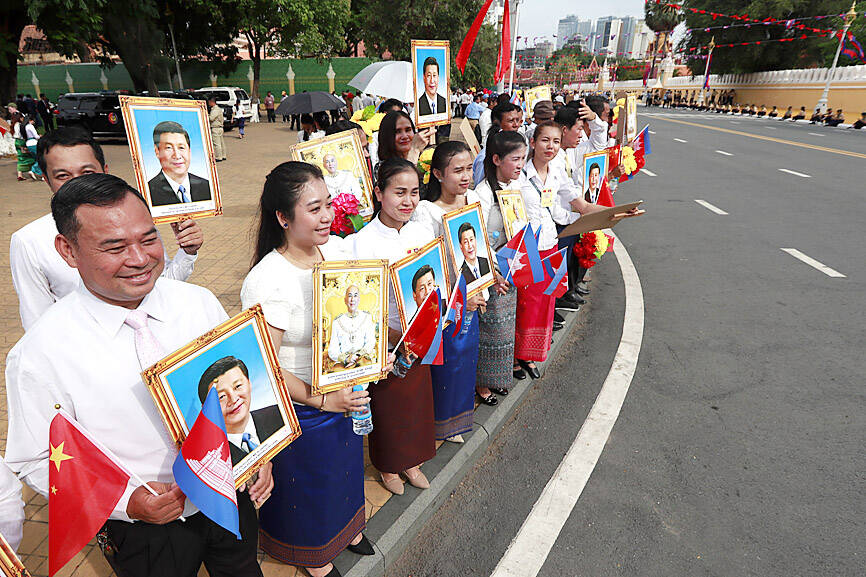Chinese President Xi Jinping (習近平) yesterday arrived in Cambodia for a two-day state visit.
The visit, Xi’s first since 2016, concludes a three-nation Southeast Asian tour that included stops in Vietnam and Malaysia.
Xi was formally greeted at the airport in Cambodia’s capital, Phnom Penh, by Cambodian King Norodom Sihamoni.

Photo: EPA-EFE
During his visit, Xi was scheduled to meet Cambodian Prime Minister Hun Manet and Cambodian Senate President Hun Sen, who is Hun Manet’s father and predecessor as prime minister.
In a statement at Phnom Penh International Airport after his arrival on his presidential aircraft, Xi said he was “delighted” to visit again.
“Cambodia is a priority in China’s neighborhood diplomacy. China will unswervingly support Cambodia in upholding strategic autonomy and in pursuing a development path suited to its national conditions,” he said, according to a transcript of his remarks distributed by the Chinese embassy.
Trade was likely be a major topic of Xi’s discussions in Cambodia, which faces among the highest tariff rates proposed by Washington.
China is presenting itself as a source of stability and certainty as Southeast Asia scrambles to respond to tariffs imposed by US President Donald Trump, which threaten the region export-oriented economies whose largest markets are generally the US.
In addition to a universal 10 percent tariff, the country faces the threat of a 49 percent tax on exports to the US once a 90-day pause expires.
In addition to discussions on improving bilateral ties, and regional and international issues, several agreements were expected to be signed on cooperation in various sectors.
The visit comes on the 50th anniversary of the April 17, 1975, takeover of Cambodia by the communist Khmer Rouge, which imposed a reign of terror with Maoist-inspired policies that saw an estimated 1.7 million Cambodians die of starvation or overwork, as well as executions.
Beijing was the main foreign backer of the Khmer Rouge and supported the group in carrying on a guerrilla war after it was ousted from power in 1979 by an invasion from Vietnam.
Cambodia’s rapid growth in the past few decades has been fueled largely by Beijing.

Authorities have detained three former Taiwan Semiconductor Manufacturing Co (TMSC, 台積電) employees on suspicion of compromising classified technology used in making 2-nanometer chips, the Taiwan High Prosecutors’ Office said yesterday. Prosecutors are holding a former TSMC engineer surnamed Chen (陳) and two recently sacked TSMC engineers, including one person surnamed Wu (吳) in detention with restricted communication, following an investigation launched on July 25, a statement said. The announcement came a day after Nikkei Asia reported on the technology theft in an exclusive story, saying TSMC had fired two workers for contravening data rules on advanced chipmaking technology. Two-nanometer wafers are the most

DEFENSE: The first set of three NASAMS that were previously purchased is expected to be delivered by the end of this year and deployed near the capital, sources said Taiwan plans to procure 28 more sets of M-142 High Mobility Artillery Rocket Systems (HIMARS), as well as nine additional sets of National Advanced Surface-to-Air Missile Systems (NASAMS), military sources said yesterday. Taiwan had previously purchased 29 HIMARS launchers from the US and received the first 11 last year. Once the planned purchases are completed and delivered, Taiwan would have 57 sets of HIMARS. The army has also increased the number of MGM-140 Army Tactical Missile Systems (ATACMS) purchased from 64 to 84, the sources added. Each HIMARS launch pod can carry six Guided Multiple Launch Rocket Systems, capable of

CHINA’s BULLYING: The former British prime minister said that he believes ‘Taiwan can and will’ protect its freedom and democracy, as its people are lovers of liberty Former British prime minister Boris Johnson yesterday said Western nations should have the courage to stand with and deepen their economic partnerships with Taiwan in the face of China’s intensified pressure. He made the remarks at the ninth Ketagalan Forum: 2025 Indo-Pacific Security Dialogue hosted by the Ministry of Foreign Affairs and the Prospect Foundation in Taipei. Johnson, who is visiting Taiwan for the first time, said he had seen Taiwan’s coastline on a screen on his indoor bicycle, but wanted to learn more about the nation, including its artificial intelligence (AI) development, the key technology of the 21st century. Calling himself an

South Korea yesterday said that it was removing loudspeakers used to blare K-pop and news reports to North Korea, as the new administration in Seoul tries to ease tensions with its bellicose neighbor. The nations, still technically at war, had already halted propaganda broadcasts along the demilitarized zone, Seoul’s military said in June after the election of South Korean President Lee Jae-myung. It said in June that Pyongyang stopped transmitting bizarre, unsettling noises along the border that had become a major nuisance for South Korean residents, a day after South Korea’s loudspeakers fell silent. “Starting today, the military has begun removing the loudspeakers,”